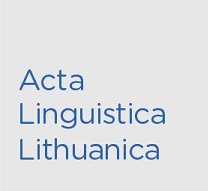Leksikologijos pradmenys Jokūbo Perkūno traktate Wohlgegründetes Bedenken über die ins Litauische übersetzten zehn Fabeln Aesopi und derselben passionierte Zuschrift (1706)
The Basics of Lexicology in the Tractate Wohlgegründetes Bedenken über die ins Litauische übersetzten zehn Fabeln Aesopi und derselben passionierte Zuschrift (1706) by Jokūbas Perkūnas
Author(s): Ona AleknavičienėSubject(s): Theoretical Linguistics, Lexis, Historical Linguistics, Baltic Languages
Published by: Lietuvių Kalbos Institutas
Keywords: Jokūbas Perkūnas; Michaeli Mörlin; Minor Lithuania; history of Lithuanian linguistics, lexicology;
Summary/Abstract: The tractate of Jokūbas Perkūnas Wohlgegründetes Bedenken über die ins Litauische übersetzten zehn Fabeln Aesopi und derselben passionierte Zuschrift (1706) is analysed as a source of linguistic idea in lexicology in this article. While analyzing the skills of the translator of the Aesop’s fables Die Fabuln Aesopi (1706) to practically apply the principles of language use and standardization declared in Die Fabeln Aesopi Michaeli Mörlin’s tractate Principium primarium in lingva Lithvanica (1706) Jokūbas Perkūnas paid great attention to lexis. The research of Perkūnas referred to practical (empirical) level, i.e. the collection of linguistic data, its evaluation and presentation as opposed to theoretical generalisations and rigid decision making. Even though Perkūnas paid less attention to theoretical consideration of lexis norms than Mörlin, however, the corrected and commented words and word junctions of Aesop’s fables demonstrate the way he perceived issues which are analysed by lexicology (polysemy, homographs, synonymy, lexical and grammatical valency, loan words and phraseology). By offering his variant Perkūnas referred to both: quantitative criterion i.e. more widely spread usage and qualitative criterion, i.e. best notional expression.
Journal: Acta Linguistica Lithuanica
- Issue Year: 2015
- Issue No: 72
- Page Range: 9-40
- Page Count: 32
- Language: Lithuanian

